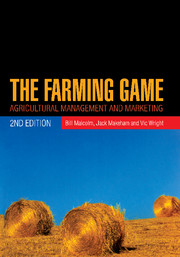Book contents
- Frontmatter
- Contents
- Preface
- Acknowledgments
- List of figures and tables
- 1 Introduction
- 2 The business of farming
- 3 Analysing a farm business
- 4 Analysing innovation in the whole farm business
- 5 Managing risk and uncertainty
- 6 Marketing agricultural products
- 7 Conclusion
- Discounting procedures and tables
- References and further reading
- Glossaries
- Index
- References
4 - Analysing innovation in the whole farm business
Published online by Cambridge University Press: 05 June 2012
- Frontmatter
- Contents
- Preface
- Acknowledgments
- List of figures and tables
- 1 Introduction
- 2 The business of farming
- 3 Analysing a farm business
- 4 Analysing innovation in the whole farm business
- 5 Managing risk and uncertainty
- 6 Marketing agricultural products
- 7 Conclusion
- Discounting procedures and tables
- References and further reading
- Glossaries
- Index
- References
Summary
The main challenge faced by managers of farm businesses is to manage change. In this chapter the main budget techniques for analysing the economic merit of investing to change a farm system are explained.
Introduction
Business managers can either embrace change to increase productivity and achieve the necessary growth of their business, or have other less desirable change forced upon them. Having established the state of a business as it currently operates, the main task for management is to analyse the options for change to increase the productivity of the business. This process involves (a) identifying innovations, (b) imagining alternative futures, and (c) judging alternative futures against criteria of feasibility, likelihood and contribution to achieving goals.
Innovation in farm businesses means identifying and implementing different ways of using resources in farm businesses. Analysing decisions about alternative ways of using resources in a business involves using information to help form judgments about relationships between costs and benefits in the changed system sometime in the future, even though much about the future situation is unable to be known well or at all, or is unable to be quantified well or at all. Nevertheless, it is still useful to approach the question of innovation in the business in a rigorous and systematic manner, making explicit what is known and likely and assumed, and thinking hard about, and defining, plausible possible future states of the world with and without the changes in question.
- Type
- Chapter
- Information
- The Farming GameAgricultural Management and Marketing, pp. 123 - 178Publisher: Cambridge University PressPrint publication year: 2005



